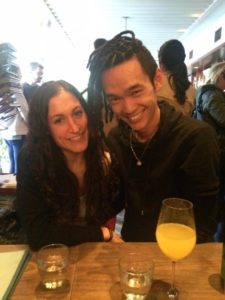It’s okay to serve Black communities, but please know: no one expects you to be Black.
Last weekend I attended the 2017 Yoga Service Council Conference where well-meaning yogis gathered to share ideas, learnings and research on how yoga and mindfulness can help support underserved communities such as youth, veterans and others.
Unless you’re Betsy DeVos, it’s easy to see how intersectionality slapped us in the face faster than a police officer reaching for their gun when approaching a Black teen.
In a workshop called, “Best Practices for Cultural Competency: A View from a Historically Black College”, the question covered in so many layers of White guilt finally came out:
I work in prisons. I’ve done trauma-informed trainings, I set up a safe space, I try to give my student options, but how can I better serve them? I feel like they’re going to judge me regardless, because I’m White, because I’m a woman, because I’m young, because I’m pretty. They’re going to judge me because I’m not Black.
Disclaimer: some of the above is paraphrased. The underlined is verbatim because I remember traces of my lunch somersaulting up my throat. The last sentence’s problem seems to call for the logical solution of just ‘becoming’ Black. As if all Blackness is the same and all Black educators and students hold hands in the playground skipping and picking out flowers.
But not dissimilar to my life at large, I swallowed. I needed all the seats at Barclays Center. I’m an Asian man teaching yoga and mindfulness to youth – about 90% of whom are Black or Brown. I’ve also fallen into this trap.
This question reminded me that once upon a time I felt the need to self-censor my lifestyle and interests in fear of creating a have versus have-nots environment in my classrooms. Do I bring my personal laptop to the classroom? How do I answer students asking me about my summer vacation?
When sh*t happens, it’s 10% the actual sh*t and 90% you. What were my unresolved issues around my privilege? As one contributor pointed out in the discussion, if you’re nowhere near being woke in yourself, you have no business trying to wake other people up – no matter what you think you’re in a position to teach.
How do I now bring my best, authentic self to New York City public school classrooms every week, in spite of the differences between my kids and I? These are the questions I’ve realized have helped me.
Why this population?
Working with incarcerated men and women or under-served youth is not synonymous with working with People of Color (POC).
If you love the work that you do, you should love it no matter where or who you’re teaching. If you get a particular kick out of teaching POC, in this case Black men and women in the criminal justice system – cut yourself a check.
Understand that you may not be the first choice for this hired position. Institutionalized and structural racism has made it so there may not have been a whole lot of POC candidates for your role. Would your supervisor have preferred someone in your place who looks and sounds like the people you serve? Likely.
Acknowledge your privilege. Say, “I acknowledge my privilege,” and not “I accept my privilege, but -”. No buts. That is your burden. As Teo Drake says, sit on your discomfort so that others can be free.
The same contributor to the discussion I mentioned also added, “I’m hearing a lot of doing. I did this, I got certified in that. I’m not hearing a lot of being. Just be. How are you being in that space?” Your students likely want to see you. Newsflash: it’s not the first time they’ve encountered a White authority or teacher figure.
If Black communities are carrying centuries-old oppression on their shoulders and your burden is to not finish a sentence and just be your authentic self, that’s a pretty good deal.
Am I culturally appropriating?
I learned this the hard way. I once had fake dreadlocks put in my hair. While there may be justifications, positive sentiment and contextual reasons why one may do it, by definition, taking or using things that do not belong to your own culture is cultural appropriation. It just is.
Within the vacuum of cultural appropriation and serving communities of color, I often see it as being born out of a desire to bridge gaps, build likeness and focus on commonalities. As I’ve learned from The Grapevine, focusing on commonalities is something only privileged people say. For everyone else, the difference are so glaring we’re too debilitated to look at anything else.
Don’t lock your hair. Don’t wear a dashiki.
Be you. Not Miley Cyrus.
Am I posing?
This relates to my last point. Be yourself.
If you don’t know what a lace-front is, can only name The Color Purple as one of Alice Walker’s works (and haven’t read it!) and you didn’t know Taraji P Henson once played a pregnant prostitute alongside Terrence Howard and a much heavier Anthony Anderson in the 2005 film Hustle and Flow (before she so elegantly soared us into space): Do. Not. Pretend.
As my students tell me, “We read you (insert side-eye)!” It’s not a first date. Don’t fake it. You’ll be inviting so much shade I won’t be able see you. And you’re White.
If you’ve ever tried to crank it, whip, nae nae or use the words turnt, clap back or thot – STOP. Those expressions aren’t here for you and you don’t need to pretend you’re an insider.
Your nose is way too high, you need to cut it.
Admitting you don’t know gives the other person power. They can offer you something. If you care so much about your disenfranchised students, that’s meant to be important right?
Silently nodding is not OK. Do I silently nod when my friends suggest a road trip? No! I point at my skin and remind them they don’t want me to drive!
AsAmNews has Asian America in its heart. We’re an all-volunteer effort of dedicated staff and interns. You can show your support by liking our Facebook page at www.facebook.com/asamnews, following us on Twitter, sharing our stories, interning or joining our staff.




RE: 3 Questions to Ask Yourself When Serving People of Color: He sounds so whitewashed! He forgets he is too a POC! It people like him that upset me and the reason Asians get ridiculed and called ‘token whites’ or ‘soul sellers for the white man’s hand me downs’. His mind set is the real reason trust is hard to have among people. He needs to check his made up privileges. Sorry if I sound harsh but it hurt my inner peace just reading and knowing he actually felt okay.